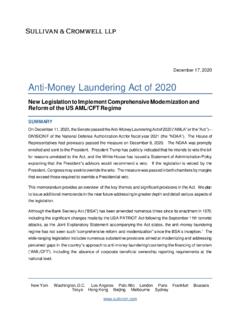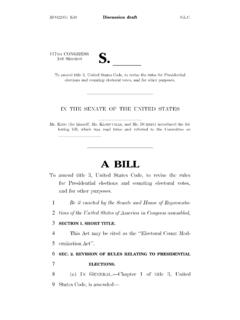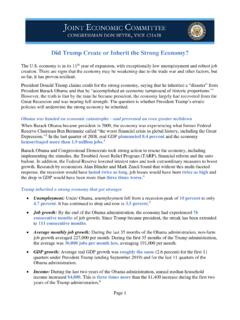Transcription of E. AMATEUR ATHLETIC ORGANIZATIONS - IRS tax forms
1 E. AMATEUR ATHLETIC ORGANIZATIONS 1. Introduction This article is concerned with the exemption from tax of AMATEUR ATHLETIC ORGANIZATIONS under IRC 501(c)(3) and IRC 501(j). This subject has been discussed previously in the 1980 ATRI at page 62 and in the 1982 CPE at page 83. 2. Background An AMATEUR ATHLETIC organization may qualify for IRC 501(c)(3) exemption under three different rationales. First, an AMATEUR ATHLETIC organization may be classified as "educational" under IRC 501(c)(3) on the grounds that it teaches sports to youth or is affiliated with an exempt educational organization . Rev. Rul. 80-215, 1980-2 174; Rev. Rul. 77-365, 1977-2 192; Rev. Rul. 67-291, 1967-2 184; Rev. Rul. 64-275, 1964-2 142; Rev. Rul. 55-587, 1955-2 261. Second, an AMATEUR ATHLETIC organization may be classified as "charitable" under IRC 501(c)(3) on the grounds that it combats juvenile delinquency or lessens the burdens of government.
2 Rev. Rul. 80-215, 1980-2 174; Rev. Rul. 59-310, 1959-2 146. Third, an organization may be exempt on the grounds that it is designed "to foster national or international AMATEUR sports competition (but only if no part of its activities involve the provision of ATHLETIC facilities or equipment)" as provided in IRC 501(c)(3). ORGANIZATIONS that meet the requirements of fostering ATHLETIC competition under IRC 501(c)(3) may also seek classification as "qualified AMATEUR sports ORGANIZATIONS " under IRC 501(j). Qualified AMATEUR sports ORGANIZATIONS are not prohibited from providing facilities and equipment. A number of ORGANIZATIONS were granted exemption under the "charitable" or "educational" rationales long before the " AMATEUR ATHLETIC " provision was added to the Code in 1976. Since the enactment of the " AMATEUR ATHLETIC " provision, attention has been focused on that section and on IRC 501(j).
3 The " AMATEUR ATHLETIC " provision of IRC 501(c)(3), however, is not exclusive. The "charitable" and "educational" rationales are still very much alive and exemption may be granted under those rationales as well as under the " AMATEUR ATHLETIC " provision. (See Committee Report, 1976 Tax Reform 94-455, 10-4-76.) Since previous articles have examined the exemption of ATHLETIC ORGANIZATIONS under IRC 501(c)(3) in considerable detail, this article is primarily devoted to examining the history, meaning, and limitations of IRC 501(j) and its interaction with IRC 501(c)(3). Recent developments in the classification of AMATEUR ATHLETIC ORGANIZATIONS as charitable or educational will also be considered. 3. Provision of Facilities or Equipment As stated above, IRC 501(c)(3) provides for the exemption under IRC 501(a) of ORGANIZATIONS which are organized and operated exclusively "to foster national or international AMATEUR sports competition (but only if no part of its activities involve the provision of ATHLETIC facilities or equipment).
4 " In 1982, IRC 501(j) was added to the Code. That section provides: (j) Special Rules for Certain AMATEUR Sports ORGANIZATIONS --(1) In In the case of a qualified AMATEUR sports organization -(A) the requirement of subsection (c)(3) that no part of its activities involve the provision of ATHLETIC facilities or equipment shall not apply, and (B) such organization shall not fail to meet the requirements of subsection (c)(3) merely because its membership is local or regional in nature. (2) Qualified AMATEUR sports organization For purposes of this subsection, the term "qualified AMATEUR sports organization " means any organization organized and operated exclusively to foster national or international AMATEUR sports competition if such organization is also organized and operated primarily to conduct national or international competition in sports or to support and develop AMATEUR athletes for national or international competition in such sports.
5 The intention of this section was to relieve certain ORGANIZATIONS from the prohibition against the provision of facilities and equipment. That prohibition had been very strictly construed by the Service. For example, an organization which, as part of its coaching program, made videotapes of athletes for the purpose of analyzing their performance could not be granted exemption as an AMATEUR ATHLETIC organization under IRC 501(c)(3), since the use of videotape equipment was considered the provision of equipment. According to Senator Stevens, who introduced IRC 501(j) in the senate , the section was needed because "for 5 years, and especially since the 1978 AMATEUR Sports Act spun off new national governing bodies for competitive sports, this statute [ , 501(c)(3)] has caused tremendous financial problems for the AMATEUR sports world and that is why our immediate action is necessary.
6 Many of the development drives that assist and prepare our Olympic athletes and other national and regional AMATEUR sports ORGANIZATIONS are at a standstill simply because it is necessary for many of these ORGANIZATIONS to provide training facilities and equipment and they cannot receive tax exempt status under the current interpretation." 128 Cong. Rec. S8919 (July 22, 1982) (statement of Senator Stevens). An organization which seeks exemption as a "qualified AMATEUR sports organization " under IRC 501(j) must meet the requirements imposed on AMATEUR ATHLETIC ORGANIZATIONS under IRC 501(c)(3) as well as the requirements specified in IRC 501(j)(2). The former section states that an organization must "foster national or international sports competition." The latter section requires an organization to "conduct national or international competition in sports or to support and develop AMATEUR athletes for national or international competition in such sports.
7 " We must assume that Congress intended the requirements of these two Code sections to have different meanings, for if the two requirements are identical Congress could have achieved its desired result by simply striking out of IRC 501(c)(3) the prohibition against the provision of facilities and equipment. As a practical matter, however, it is difficult to distinguish between the requirements of the two sections. Almost all ORGANIZATIONS which "foster national or international sports competition" will do so by conducting national or international competition or by supporting or developing AMATEUR athletes for such competition. Typically, the activities of AMATEUR ATHLETIC ORGANIZATIONS are the promulgation of official rules and standards of play, the chartering and supervision of teams, the provision of coaching, equipment, and facilities, the organization of inter-team competition, and the promotion and advertisement of a sport.
8 All of these activities constitute the conduct of competition or development of athletes as well as the fostering of competition. It is theoretically possible for an organization to satisfy the " AMATEUR ATHLETIC " standards of IRC 501(c)(3) and not be a "qualified AMATEUR sports organization " under IRC 501(j)(2). The tax law specialist must be alert to this possibility. It will be a rare organization , however, which will satisfy the standards of IRC 501(c)(3) and not qualify under IRC 501(j). As a practical matter, therefore, the prohibition against the provision of facilities and equipment will rarely apply to an exempt AMATEUR ATHLETIC organization . This situation is well illustrated by 39459. In that case an organization had as its stated objectives the prescribing of rules and standards for competition in women's bowling, encouraging AMATEUR participation in that sport, educating the public on the sport, sponsoring and conducting national and international competitions, and adopting uniform qualifications for membership.
9 The organization was recognized by the United States Olympic Committee as the national governing body in that sport and the organization sponsored a team in the Pan American Games, including providing team members with uniforms and equipment. The Service found that the organization 's activities satisfied the requirements of IRC 501(j) and, but for the provision of equipment, also satisfied the AMATEUR ATHLETIC requirements of IRC 501(c)(3). It must be remembered that some ATHLETIC ORGANIZATIONS qualify for exemption on the grounds that they are charitable or educational. The prohibition against the provision of facilities and equipment does not and never has applied to these ORGANIZATIONS . An organization which qualifies as charitable or educational may, therefore, seek exemption on those grounds and thus avoid the complexities of the " AMATEUR ATHLETIC " provisions of IRC 501(c)(3) and IRC 501(j).
10 Exempt ORGANIZATIONS specialists must examine applications under all three possibilities. 4. National or International Competition IRC 501(c)(3) provides that AMATEUR ATHLETIC ORGANIZATIONS are exempt only if they "foster national or international sports competition." IRC 501(j)(2) retains this requirement. The precise meaning of "national or international sports competition" has been the subject of considerable debate ever since that term was first used in the Code. The legislative history of IRC 501(c)(3) indicates that the section was not intended to grant exemption to "social clubs or ORGANIZATIONS of casual athletes" or to ORGANIZATIONS "whose primary purposes are the recreation of their members." (Senator Culver, 122 Cong. Rec. 25,961 (1976)). It is therefore necessary for the Service to distinguish between social/recreational ORGANIZATIONS and ORGANIZATIONS that promote serious competition.
















